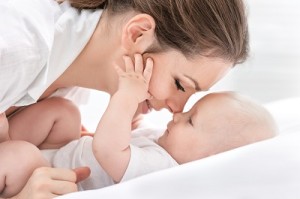- Calls to this hotline are currently being directed to Within Health, Fay or Eating Disorder Solutions
- Representatives are standing by 24/7 to help answer your questions
- All calls are confidential and HIPAA compliant
- There is no obligation or cost to call
- Eating Disorder Hope does not receive any commissions or fees dependent upon which provider you select
- Additional treatment providers are located on our directory or samhsa.gov
Fertility and Eating Disorders: What Is The Impact on Pregnancy?

Having a baby is the most amazing feat of love and the human body. Many in eating disorder recovery are concerned with fertility and eating disorders and they are afraid that their disorder will take that meaningful experience away from them.
While it is true that the harmful effects eating disorders have on the body can impact fertility, it does not mean that having a family is out of your reach.
A Female Thing
Eating disorders are both physical and mental disorders and take a toll on the body. One negative impact of eating disorders on the body is amenorrhea, or, the absence of menstruation.
Eating disorders often result in an individual having inadequate body fat. Estrogen, the hormone that promotes the development of female body characteristics, is stored in body fat [1]. Reduced body fat means reduced estrogen, resulting in the loss of menstruation.
Reduced estrogen can also result in issues with infertility [1]. However, it is worth noting that a lack of menstruation does not mean a lack of ovulation, as some studies indicate that gestation, the process of carrying or being carried in the womb between conception and birth, can begin without prior menstruation [1].
This means that an individual currently experiencing an eating disorder or at the beginning of recovery, may find conception more difficult but that it is not impossible. The good news is that restoring weight often leads to resumed menses. Researchers find that 17% body fat or more is generally required for this [1].
Long-Term
As mentioned above, female reproductive hormones and processes can resume when an individual gains body fat. However, many are concerned about the long-term, and less reversible impacts that eating disorders may have on pregnancy.
In regard to fertility, one study found that fertility is modestly affected by eating disorders [1]. The word “modestly” was likely added because those with Anorexia Nervosa or Bulimia Nervosa were more likely to receive medical assistance in conceiving and to take longer than six months to conceive [2].
Planning Ahead
 It is important to note that this is only the tip of the iceberg. How a current, or past, eating disorder impacts pregnancy itself is another matter.
It is important to note that this is only the tip of the iceberg. How a current, or past, eating disorder impacts pregnancy itself is another matter.
Many studies have indicated that eating disorders increase the risk of pregnancy and birth complications, particularly if the individual is still currently engaging in disordered eating behaviors [1].
If you are planning a family and wonder how your experience with an eating disorder may impact this, the safest decision is to meet with a doctor. It would be especially helpful to work with a medical professional familiar with eating disorders and pregnancy.
Every body is different so an eating disorder will not have the same impact on each person. Speak with your doctor about how you can best care for the incredible body that could carry your baby into this world.
References:
[1] James, Dotti C. (2001). Eating disorders, fertility, and pregnancy: relationships and complications. The Journal of Perinatal & Neonatal Nursing, 15:2, 36-48. [2] Rebar, Robert W. (2011) Long-term effects of eating disorders on fertility and pregnancy. Journal Watch: Women’s Health. About the Author:
About the Author:
Margot Rittenhouse, MS, PLPC, NCC is a therapist who is passionate about providing mental health support to all in need and has worked with clients with substance abuse issues, eating disorders, domestic violence victims, and offenders, and severely mentally ill youth.
As a freelance writer for Eating Disorder Hope and Addiction Hope and a mentor with MentorConnect, Margot is a passionate eating disorder advocate, committed to de-stigmatizing these illnesses while showing support for those struggling through mentoring, writing, and volunteering. Margot has a Master’s of Science in Clinical Mental Health Counseling from Johns Hopkins University.
The opinions and views of our guest contributors are shared to provide a broad perspective on eating disorders. These are not necessarily the views of Eating Disorder Hope, but an effort to offer a discussion of various issues by different concerned individuals.
We at Eating Disorder Hope understand that eating disorders result from a combination of environmental and genetic factors. If you or a loved one are suffering from an eating disorder, please know that there is hope for you, and seek immediate professional help.
Published on February 15, 2019.
Reviewed & Approved on February 15, 2019, by Jacquelyn Ekern MS, LPC
Published on EatingDisorderHope.com
–

The EatingDisorderHope.com editorial team comprises experienced writers, editors, and medical reviewers specializing in eating disorders, treatment, and mental and behavioral health.

